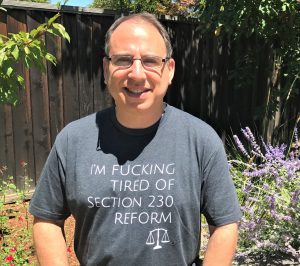New Essay: “Regulating Internet Services by Size”

I think the essay’s discussion about how to define “Big Tech” is especially crucial today. In 2021, we have seen dozens or hundreds of proposed bills–both at the state and federal level–defining large Internet services for harsher regulatory treatment. Currently, the drafting of these definitions is uniformly garbage. After you read the essay, you will never look at those provisions the same way. Instead, armed with the essay’s insight, you will easy spot a half-dozen drafting flaws in EVERY. SINGLE. BILL. At that point, you will be disappointed and possibly angry with the drafters for doing such a poor job–which will give you yet another reason to question the bill’s legitimacy.
This issue isn’t going away any time soon. So long as there is political gold in trashing Big Tech, we’ll keep seeing laws attempting to define it. Do those legislative drafters a favor and send them this article so that they can avoid making amateur-hour mistakes in public.
Of course, even if those definitional flaws are fixed, the bills are probably bad policy. That’s where the second part of the essay kicks in. As we explain in the essay, deficient policy ideas shouldn’t apply to anyone, even the nefarious “Big Tech.” Meanwhile, good policy ideas maybe should apply to everyone, not just the smaller entities. I hope this section will spark some much-needed discussion about what would really happen if Section 230, or other Internet regulations, treats Big Tech more harshly. For reasons we explain, many of those ideas are just bad policy. Sadly, most regulators don’t care whether or not they craft good policy because it’s more fun to penalize Big Tech for the lulz.
Hope you enjoy the essay. The abstract:
In their zeal to curb Big Tech, regulators are crafting legislative reforms that make distinctions between Internet services based on size. A crucial Internet law, Section 230, is among the targets for such reforms. This essay discusses the nuanced considerations that regulators should address when drafting size-based distinctions for Internet services. It also raises concerns that such distinctions are not good policy in the context of Section 230.